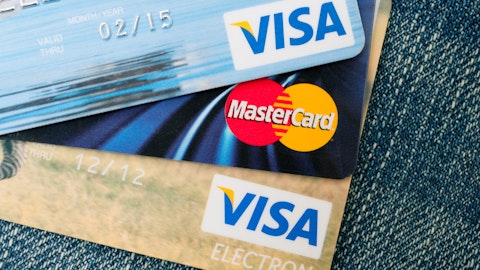12: United Parcel Service, Inc. (NYSE:UPS)
Percent of Warren Buffett’s Portfolio: 0.1%
Dividend Yield: 3.0% Forward P/E Ratio: 18.3x (as of 4/15/16)
Sector: Industrials Industry: Air Freight Transport
Dividend Growth Streak: 7 years
United Parcel Service, Inc. (NYSE:UPS) was founded in 1907 and has grown to become the largest package delivery company in the world. In 2015, UPS delivered 18.3 million pieces per day and generated total revenue of $58.4 billion.
Warren Buffett has owned United Parcel Services since 2007, although it has remained a very small part of Berkshire Hathaway’s portfolio.
Despite the small position size, UPS has strong competitive advantages. As a logistics company, UPS derives its economic moat from being a world-class operator with extremely efficient business processes.
Distributing products is largely a density game. The operator with the most routes is able to more efficiently deliver products and save customers costs.
With the largest integrated distribution network in its industry, UPS enjoys stronger profit margins than its peers and has proven to be an extremely resilient business – the company has paid dividends since 1969 and averaged dividend growth of 9.9% since its IPO.
Replicating the company’s distribution network would be extremely costly and impractical in most cases, protecting United Parcel Service, Inc. (NYSE:UPS)’s market share.
Follow United Parcel Service Inc (NYSE:UPS)
Follow United Parcel Service Inc (NYSE:UPS)
Receive real-time insider trading and news alerts
13: Wal-Mart Stores, Inc. (NYSE:WMT)
Percent of Warren Buffett’s Portfolio: 2.6%
Dividend Yield: 3.0% Forward P/E Ratio: 16.7x (as of 4/15/16)
Sector: Consumer Discretionary Industry: Supermarkets
Dividend Growth Streak: 43 years
Wal-Mart Stores, Inc. (NYSE:WMT) is an absolutely massive company with over $480 billion in annual sales. The company’s retail stores sell a wide assortment of consumer merchandise to over 260 million customers each week.
Wal-Mart’s main product categories are grocery (56% of sales), health & wellness (11%), and entertainment (10%). Approximately 80% of Wal-Mart’s profits are generated in the United States.
Warren Buffett has owned shares of Wal-Mart for more than a decade and was likely attracted to the company’s cost advantages.
As the world’s largest retailer, Wal-Mart can exert massive pressure on its suppliers to keep its prices low for consumers.
Smaller rivals are unable to compete with Wal-Mart’s prices, which results in Wal-Mart dominating most areas it operates in.
Wal-Mart is currently facing its share of challenges related to rising wages and e-commerce competition, but it will remain a force in brick-and-mortar retail for many years to come.
It’s also hard not to like the stability of Wal-Mart’s business. Wal-Mart sells a lot of non-discretionary products, especially grocery items.
Consumers continue buying grocers and other household items during economic downturns, which makes Wal-Mart’s cash flows and dividend all the more reliable. As a matter of fact, Wal-Mart is a member of the dividend aristocrats listbecause of its consistent dividend growth.
Buffet likes boring businesses that generate plenty of cash, and Wal-Mart Stores, Inc. (NYSE:WMT) is no exception.
Follow Walmart Inc. (NYSE:WMT)
Follow Walmart Inc. (NYSE:WMT)
Receive real-time insider trading and news alerts
14: Johnson & Johnson (NYSE:JNJ)
Percent of Warren Buffett’s Portfolio: 2.6%
Dividend Yield: 2.8% Forward P/E Ratio: 16.9x (as of 4/15/16)
Sector: Medical Industry: Pharma
Dividend Growth Streak: 53 years
Johnson & Johnson (NYSE:JNJ) is one of the biggest healthcare companies in the world with over $70 billion in sales. Most of J&J’s profits are from sales of branded pharmaceuticals, but the company also big consumer products and medical devices businesses.
Johnson & Johnson is a very international business with just over half of its sales coming from international markets.
Johnson & Johnson used to be one of Buffett’s biggest holdings 10 years ago but is one of Berkshire Hathaway’s smallest holdings today.
Why did Warren Buffett invest in Johnson & Johnson in the first place? For one thing, healthcare is one of the best stock sectors for dividends because of its stability.
People require healthcare products and services regardless of how the economy is doing, which makes Johnson & Johnson’s cash flows very reliable. The company’s sales were only down in the low-single digits during the financial crisis, and JNJ’s stock beat the S&P 500 by 29% in 2008.
Johnson & Johnson’s management team has also positioned the company in markets it can dominate. Roughly 70% of its sales are from number one or number two market share positions.
To remain competitive, the company invests over $8 billion in research and development each year. While the development of new drugs is risky, Johnson & Johnson has an excellent track record and can use the predictable cash flows from its consumer businesses to steadily fund new product research.
Johnson & Johnson (NYSE:JNJ) has a pristine balance sheet with over $20 billion in excess cash, generates reliable free cash flow every year, earns a strong return on equity, and is well positioned to benefit from rising global spending on healthcare. These are all good things that Buffett looks for when he invests.
Read More: Johnson & Johnson – A Rock Solid Dividend
Follow Johnson & Johnson (NYSE:JNJ)
Follow Johnson & Johnson (NYSE:JNJ)
Receive real-time insider trading and news alerts





